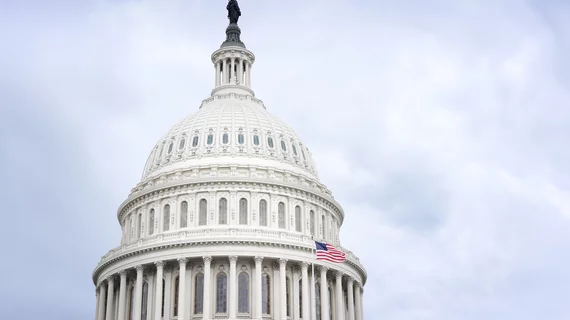Lawmakers introduce radiologist-endorsed, bipartisan bill to halt Medicare cuts
Members of Congress on Tuesday introduced a radiologist-supported bipartisan bill to halt planned physician pay cuts in the Medicare program.
Greg Murphy, MD, R-N.C., and colleagues are proposing the Medicare Patient Access and Practice Stabilization Act, which would halt a 2.8% reduction to the conversion factor used to calculate physician payment. The feds first revealed the reduction in July, with balance-budget rules requiring that increases in spending under the fee schedule necessitate cuts elsewhere.
Several medical doctor members of the U.S. House are co-sponsoring the bill, which is supported by the American College of Radiology, Society of Interventional Radiology, and numerous other physician societies.
"Having an outdated Medicare reimbursement rate for physicians makes it harder for healthcare professionals to provide high-quality care, putting patients at risk," Rep. Ami Bera, MD, D-Calif., said in a statement shared Oct. 29. "Physicians, unlike the rest of the players in healthcare, have never received an inflationary update and consistently received cuts. This bill ensures a more stable Medicare payment system, allowing providers to focus on delivering care rather than worrying about losing their practice.”
ACR on Tuesday called for “swift congressional action” to pass the bill. Other medical societies also issued statements praising the proposal, including the Medical Group Management Association and the American Medical Association.
“Before it adjourns at the end of the year, Congress must act on this bill to increase the conversion factor and help ensure that radiology practices and all healthcare providers can continue to offer high-quality care,” Dana Smetherman, MD, MBA, CEO of the American College of Radiology, said in a statement. “As physician payment legislation continues to evolve, lawmakers must continue to work with the House of Medicine to enact this legislation and Medicare payment reform that stabilizes the practice environment and safeguards patient access to lifesaving care,” she added later.
“Congress must act to pass the Medicare Patient Access and Practice Stabilization Act and prevent further catastrophic cuts to provider reimbursement,” Kit Crancer, RBMA immediate past president, told Radiology Business Tuesday. “These cuts have exacerbated consolidation, limited patient access to care, and are overwhelmingly unpopular with the American public.”
Murphy and colleagues noted that, when adjusting for inflation, Medicare physician payment has decreased 29% since 2001, according to the AMA. Along with the 2.8% conversion factor cut, doctors also face an estimated 3.6% increase in practice expenses in 2025. Others sponsoring the Medicare Patient Access and Practice Stabilization Act include Reps. Larry Bucshon, MD, R-Ind., John Joyce, MD, R-Pa., Mariannette Miller-Meeks, MD, R-Iowa, Jimmy Panetta, D-Calif., and Raul Ruiz, MD, D-Calif. A total of 233 representatives sent a letter to House leadership Oct. 11, urging colleagues to come together and pass a doc fix during the lame duck session after Nov. 5.

